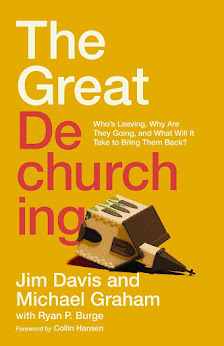THE GREAT DECHURCHING: WHO'S LEAVING, WHY ARE THEY GOING, and WHAT WILL IT TAKE to BRING THEM BACK? (audiobook) by Jim Davis and Michael Graham with Ryan P. Burge.
Read by Jim Davis, Michael Graham, and Ryan P. Burge.
Duration: 7 hours, 3 minutes.
Unabridged.
America's church members are dropping out of church at a record pace - millions upon millions over the last 2 decades and, according to the stats, the only thing that will slow the pace is the fact that Christianity in America will be so much smaller that it will statistically impossible to lose so many people without completely emptying the pews.
The authors started out to identify a number of things such as:
a) Who is leaving - is it the old, the young, the middle-aged?
b) Who is staying?
c) Why are they leaving? Is it toxic politics? Sex scandals? Abuse? Lost interest? No connection?
d) Will they be willing to come back? What would it take?
This book draws heavily from a religious attitude survey administered by Baylor University from time to time. I recently read another book on Christian Nationalism that used the same surveys and these books dovetail nicely together in a concerning way for anyone that is interested in a healthy Christianity surviving in America.
One data point leaped out to the researchers. It is a common piece of conventional wisdom that "going to college" makes people drop out of church. Kids go away, get an education and are convinced that Christianity is bad.
But, it turns out that the most likely to stay in church group is college educated Christians. They discuss various theories to explain this, but the most compelling to me is the argument that church is extremely friendly to families that have success in America and buy into America's definition of success. Having a degree is a sign that you have also bought into that definition of success. The other side of that coin is the idea that the church is not friendly to people who can't (or won't) buy into that definition of success. Single moms, divorced people, and people that work for hourly wages with irregular hours just can't participate as well and feel left out. If you feel left out enough, you drop out.
To answer all of the questions at the beginning:
a) the old, the youngish (18-30), and the middle-aged are leaving.
c) Why are they leaving? Is it toxic politics? Sex scandals? Abuse? Lost interest? No connection?
d) Will they be willing to come back? What would it take?
This book draws heavily from a religious attitude survey administered by Baylor University from time to time. I recently read another book on Christian Nationalism that used the same surveys and these books dovetail nicely together in a concerning way for anyone that is interested in a healthy Christianity surviving in America.
One data point leaped out to the researchers. It is a common piece of conventional wisdom that "going to college" makes people drop out of church. Kids go away, get an education and are convinced that Christianity is bad.
But, it turns out that the most likely to stay in church group is college educated Christians. They discuss various theories to explain this, but the most compelling to me is the argument that church is extremely friendly to families that have success in America and buy into America's definition of success. Having a degree is a sign that you have also bought into that definition of success. The other side of that coin is the idea that the church is not friendly to people who can't (or won't) buy into that definition of success. Single moms, divorced people, and people that work for hourly wages with irregular hours just can't participate as well and feel left out. If you feel left out enough, you drop out.
To answer all of the questions at the beginning:
a) the old, the youngish (18-30), and the middle-aged are leaving.
b) the same ages are also staying.
c) People are leaving for all of those reasons. One of the biggest reasons is that people move and never get started at a new church.
c) People are leaving for all of those reasons. One of the biggest reasons is that people move and never get started at a new church.
d) Most are open to coming back so long as they feel like they will actually be connected. People who were abused are not likely to come back - ever.
A topic that was never covered is if this "dropping out" is occurring in other religions. For example, are American Muslims experiencing this?
This book was full of good information but not particularly riveting in its presentation. I rate it 3 stars out of 5.
A topic that was never covered is if this "dropping out" is occurring in other religions. For example, are American Muslims experiencing this?
This book was full of good information but not particularly riveting in its presentation. I rate it 3 stars out of 5.












Comments
Post a Comment